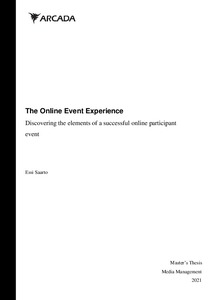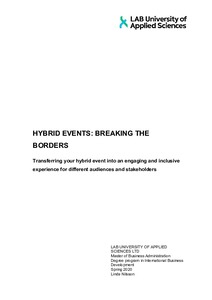Promoting DEI Practices in Event Planning Process : A focus on diaspora event design and detailed planning
Ngan, Nguyen Thai Thanh (2025)
Ngan, Nguyen Thai Thanh
2025
All rights reserved. This publication is copyrighted. You may download, display and print it for Your own personal use. Commercial use is prohibited.
Julkaisun pysyvä osoite on
https://urn.fi/URN:NBN:fi:amk-2025073123760
https://urn.fi/URN:NBN:fi:amk-2025073123760
Tiivistelmä
In the context of globalization, international migration and increasing demands for social responsibility, the events industry, especially events from diaspora communities, is increasingly expected to act as a catalyst for community engagement, social justice and sustainability. Integrating the principles of Diversity, Equity and Inclusion (DEI) into the event planning process is not only an ethical choice but also an important strategy to enhance the attendee experience, community engagement and build the organization’s image. This thesis focuses on the application of DEI values into the event planning process of the immigrant community in the Helsinki metropolitan area, Finland, where ethnic and cultural diversity is increasing. The main objective of the study is to propose a set of DEI principles applicable to external engagement practices in event planning improve the quality of the participant experience and promote community cohesion.
The thesis develops an integrated theoretical framework based on the GDEIB (Global Diversity, Equity, and Inclusion Benchmarks) model and Phase 2 of the event planning process model, focusing on five key elements: program content, venue, operations, marketing, and sourcing suppliers. Qualitative data were collected through semi-structured interviews with three diaspora community event organizers in Helsinki. Using a framework analysis approach, the study sheds light on how DEI principles are perceived and practiced at stage 2 of the event planning process.
The results show that despite the different levels of expertise and size of organizations, they all demonstrate some efforts in practicing DEI, especially in two aspects: content and external communication. However, there are still gaps in operations and supply chains, mainly due to the lack of technical standards and effective evaluation mechanisms. From there, the study proposes practical DEI application principles that can be adapted to the capacity of small and medium-sized organizations in a multicultural context.
The thesis contributes to the theory of DEI in event management, and has high applicability, providing useful reference materials for event organizers, policy makers and stakeholders interested in sustainable social development. In the long term, the set of DEI principles proposed by the author can be used as a guiding and evaluation tool to enhance representation, equity and inclusiveness in event activities in culturally diverse cities such as Helsinki and beyond.
The thesis develops an integrated theoretical framework based on the GDEIB (Global Diversity, Equity, and Inclusion Benchmarks) model and Phase 2 of the event planning process model, focusing on five key elements: program content, venue, operations, marketing, and sourcing suppliers. Qualitative data were collected through semi-structured interviews with three diaspora community event organizers in Helsinki. Using a framework analysis approach, the study sheds light on how DEI principles are perceived and practiced at stage 2 of the event planning process.
The results show that despite the different levels of expertise and size of organizations, they all demonstrate some efforts in practicing DEI, especially in two aspects: content and external communication. However, there are still gaps in operations and supply chains, mainly due to the lack of technical standards and effective evaluation mechanisms. From there, the study proposes practical DEI application principles that can be adapted to the capacity of small and medium-sized organizations in a multicultural context.
The thesis contributes to the theory of DEI in event management, and has high applicability, providing useful reference materials for event organizers, policy makers and stakeholders interested in sustainable social development. In the long term, the set of DEI principles proposed by the author can be used as a guiding and evaluation tool to enhance representation, equity and inclusiveness in event activities in culturally diverse cities such as Helsinki and beyond.
Kokoelmat
Samankaltainen aineisto
Näytetään aineisto, joilla on samankaltaisia nimekkeitä, tekijöitä tai asiasanoja.
-
The Online Event Experience - Discovering the elements of a successful online participant event
Saarto, Essi (2021)Especially after the COVID-19 pandemic, online events have become increasingly popular option for event organisers. However, online events are still perceived often as the “plan B” when physical face-to-face cannot be ... -
Hybrid Events Breaking the Borders: Transferring your hybrid event into an engaging and inclusive experience for different audiences and stakeholders
Nilsson, Linda (2020)This thesis explores hybrid events and how they can be made into an engaging experi-ence for different audiences and stakeholders. Changes in the factors affecting choos-ing of a conference location due to the COVID-19 ... -
Oxidative stress as an indicator for environmental factors in Crassostrea gigas summer mortality events : A toxicological study of Crassostrea gigas samples taken from the west coast of Sweden during the summer mortality event of 2014
Ravenscroft, Stuart (Yrkeshögskolan Novia, 2016)Crassostera gigas (Thunberg 1793), commonly known as the Pacific oyster originates from Japan but can now be found in many parts of the world due to it's extensive use in aquaculture. C. gigas was introduced to Europe in ...



